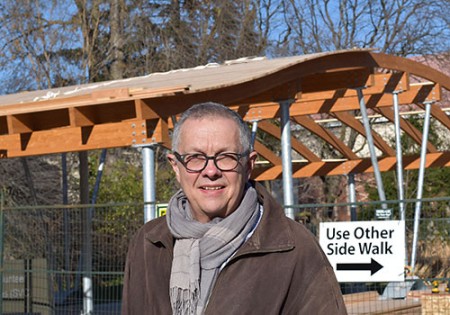
It’s a new space for storing bikes and for hosting people. A bicycle shelter being built in the heart of campus will double as a pavilion for small events and gatherings, says designer Maurice Nelischer, U of G sustainability director and professor emeritus in the School of Environmental Design and Rural Development.
The structure being erected on the edge of Branion Plaza is also environmentally friendly in more ways than one, he adds, from its promotion of human-powered transit to its curved green roof.
Lighting in the shelter will be powered by solar panels installed this fall atop the adjoining Raithby House in Branion Plaza. Says Justin Selby, senior construction coordinator in Physical Resources: “Both buildings will be sustainable.”
The wood and steel shelter will hold 90 bikes in two tiers of new removable racks. Emptied of its racks, the structure can be used as an open-sided pavilion for small groups, says Nelischer.
The $350,000 structure is being funded entirely by students through the Green Gryphon Initiative.
That initiative uses student fees and matching University contributions to support sustainable and energy-efficient projects around campus. Other recent projects include installation of the Raithby solar panels, retrofits to campus lighting and installation of a chilled water reservoir.
“Students are funding something conveying University values,” says Nelischer. “The University of Guelph is known for its commitment to sustainability and environmentally appropriate construction and design. We have the credibility and branding that we’re green.”
The structure, which is as big as a four-car garage and just over a storey high, will be completed by December. The shelter’s green roof will be planted next spring with drought-tolerant, low-maintenance plants. Temporary bike racks located nearby will be removed.
Nelischer also led the redesign of Branion Plaza along with Physical Resources two years ago. He’s a landscape architect who still teaches on campus, including a course on sustainability.
After-hours, Nelischer lives out his commitment to sustainability at home. This month, he sold a house in town that he renovated with numerous recycled materials, and he’s bought another fixer-upper where he plans to recycle the concept.